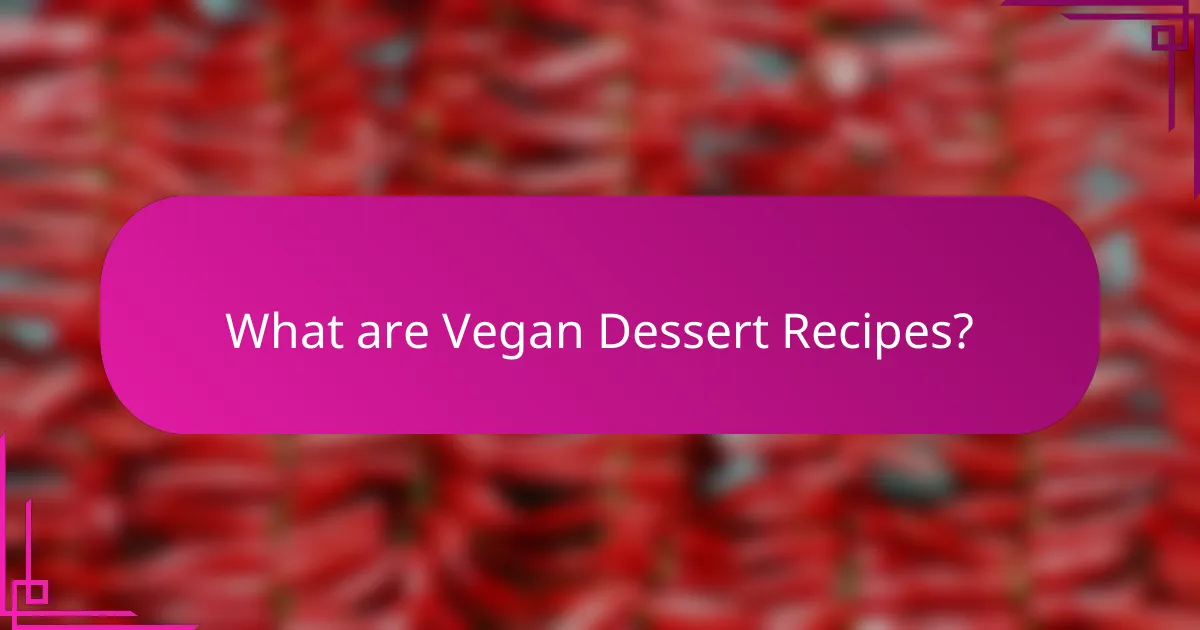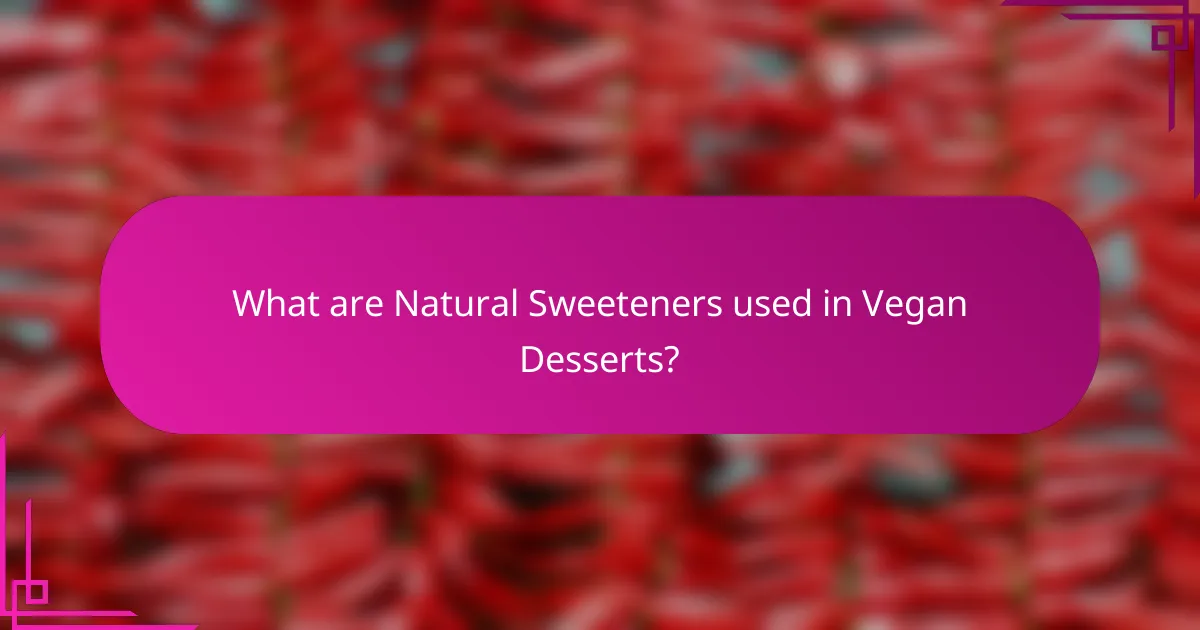Vegan dessert recipes are sweets created without animal products, utilizing plant-based ingredients such as fruits, nuts, and grains. These recipes often substitute dairy with alternatives like almond milk or coconut cream and replace eggs with flaxseed meal or applesauce. Natural sweeteners, including maple syrup, agave nectar, coconut sugar, and date sugar, are commonly used to enhance flavor while providing nutritional benefits. The article also explores creative presentation techniques for vegan desserts, such as using colorful garnishes, layering ingredients, and incorporating themed decorations to elevate the dining experience. Additionally, it highlights popular vegan dessert options like brownies, cheesecake, and cookies, showcasing their indulgent flavors and textures.

What are Vegan Dessert Recipes?
Vegan dessert recipes are sweets made without any animal products. These recipes typically use plant-based ingredients such as fruits, nuts, and grains. Common substitutes for dairy include almond milk or coconut cream. Eggs are often replaced with flaxseed meal or applesauce. Many vegan desserts utilize natural sweeteners like maple syrup or agave nectar. These recipes can cater to various dietary needs, including gluten-free options. Vegan desserts can be just as indulgent as traditional ones, offering a wide range of flavors and textures. Popular examples include vegan brownies, cheesecake, and cookies.
How do Vegan Dessert Recipes differ from traditional desserts?
Vegan dessert recipes differ from traditional desserts primarily by excluding all animal products. Traditional desserts often contain ingredients like eggs, dairy, and gelatin. In contrast, vegan desserts use plant-based substitutes such as almond milk, coconut cream, or aquafaba. These alternatives provide similar textures and flavors without animal-derived components. For example, aquafaba can mimic egg whites in meringues. Additionally, vegan desserts often rely on natural sweeteners like maple syrup or agave nectar instead of refined sugars. This approach can enhance the nutritional profile of the dessert. Studies indicate that vegan diets can lower cholesterol levels and improve heart health, further supporting the benefits of vegan desserts.
What ingredients are commonly used in Vegan Dessert Recipes?
Common ingredients in vegan dessert recipes include plant-based milk, such as almond or coconut milk. These alternatives replace dairy milk in traditional recipes. Another key ingredient is flaxseed or chia seeds, which serve as egg substitutes. They provide binding properties in baking. Natural sweeteners like maple syrup and agave nectar are also frequently used. These sweeteners offer a healthier alternative to refined sugar. Additionally, nuts and nut butters contribute flavor and texture. They enhance the richness of desserts. Cocoa powder or dark chocolate adds a chocolatey element. Lastly, fruits like bananas or applesauce often serve as natural sweeteners and moisture sources. These ingredients collectively create delicious vegan desserts.
How do Vegan Dessert Recipes cater to dietary restrictions?
Vegan dessert recipes cater to dietary restrictions by excluding animal products. This makes them suitable for those who are lactose intolerant or allergic to dairy. They often use plant-based ingredients like almond milk or coconut cream as substitutes. Many vegan desserts are also free from eggs, benefiting individuals with egg allergies. Additionally, these recipes can be easily adapted for gluten-free diets. Substitutes like almond flour or oat flour are commonly used. Vegan desserts often rely on natural sweeteners such as maple syrup or agave nectar. This caters to those seeking to reduce refined sugar intake. Overall, vegan dessert recipes offer versatility for various dietary needs.
What are the benefits of choosing Vegan Dessert Recipes?
Vegan dessert recipes offer numerous health benefits. They typically contain no animal products, which can lower cholesterol levels. Many vegan desserts use natural sweeteners like maple syrup or agave, reducing refined sugar intake. They often include whole food ingredients, increasing fiber and nutrient content. Vegan desserts are also generally lower in saturated fats, promoting heart health. Furthermore, they can cater to various dietary restrictions, such as lactose intolerance or egg allergies. Research indicates that plant-based diets can reduce the risk of chronic diseases, further supporting the advantages of vegan desserts.
How do Vegan Dessert Recipes contribute to a healthier lifestyle?
Vegan dessert recipes contribute to a healthier lifestyle by utilizing plant-based ingredients. These recipes often include natural sweeteners like maple syrup and agave nectar, which have lower glycemic indexes than refined sugars. They also incorporate whole grains, fruits, and nuts, providing essential nutrients and fiber. Research shows that a diet rich in fruits and vegetables can reduce the risk of chronic diseases. Additionally, vegan desserts are typically lower in saturated fats compared to traditional desserts, promoting heart health. By focusing on wholesome ingredients, vegan desserts support overall well-being and healthier eating habits.
What environmental benefits are associated with Vegan Dessert Recipes?
Vegan dessert recipes offer significant environmental benefits. They typically require fewer natural resources compared to traditional desserts. Plant-based ingredients use less water and land for cultivation. Livestock farming, often used in non-vegan recipes, contributes to greenhouse gas emissions. In contrast, plant-based diets lower carbon footprints. A study by the University of Oxford found that adopting a vegan diet can reduce an individual’s carbon footprint by up to 73%. Additionally, vegan desserts often utilize seasonal fruits and vegetables. This practice supports local agriculture and reduces transportation emissions. Overall, vegan dessert recipes promote sustainability and environmental health.

What are Natural Sweeteners used in Vegan Desserts?
Natural sweeteners used in vegan desserts include maple syrup, agave nectar, coconut sugar, and date sugar. Maple syrup is derived from the sap of sugar maple trees and contains antioxidants. Agave nectar is extracted from the agave plant and has a low glycemic index. Coconut sugar is made from the sap of coconut palm and retains some nutrients. Date sugar is made from dried dates and is high in fiber. These natural sweeteners provide alternatives to refined sugars while adding flavor and nutritional benefits.
How do Natural Sweeteners compare to refined sugars?
Natural sweeteners are generally considered healthier than refined sugars. They often contain vitamins, minerals, and antioxidants that refined sugars lack. For example, honey and maple syrup provide nutrients like vitamin C and manganese. In contrast, refined sugars primarily offer empty calories without nutritional value. Natural sweeteners also have a lower glycemic index, leading to less dramatic spikes in blood sugar levels. Studies indicate that consuming foods with a lower glycemic index can improve metabolic health. Furthermore, natural sweeteners may promote satiety, helping to reduce overall calorie intake. Refined sugars, on the other hand, can contribute to weight gain and increased cravings. Overall, natural sweeteners offer a more nutritious alternative to refined sugars.
What are the most popular Natural Sweeteners for Vegan Desserts?
The most popular natural sweeteners for vegan desserts include maple syrup, agave nectar, coconut sugar, and date syrup. Maple syrup is derived from the sap of sugar maple trees and has a rich flavor. Agave nectar is extracted from the agave plant and is sweeter than honey. Coconut sugar is made from the sap of coconut palm and has a caramel-like taste. Date syrup, made from blended dates, is nutrient-dense and offers a rich sweetness. These sweeteners are commonly used because they enhance flavor while being plant-based.
How can Natural Sweeteners affect the taste and texture of desserts?
Natural sweeteners can significantly alter the taste and texture of desserts. They often provide a unique flavor profile that differs from refined sugars. For example, maple syrup adds a rich, earthy taste, while agave nectar is milder and less intrusive.
In terms of texture, natural sweeteners can affect moisture content. Honey, for instance, can make desserts denser and chewier. This is due to its higher water content compared to granulated sugar.
Moreover, the caramelization process varies with natural sweeteners. Coconut sugar, for instance, caramelizes at a lower temperature, resulting in a different texture and flavor when baked.
The sweetness level also differs among natural sweeteners. Stevia is much sweeter than sugar, requiring less quantity to achieve the same sweetness level. This can lead to a lighter texture in desserts.
Overall, the choice of natural sweeteners directly influences both the taste and texture of vegan desserts, making them distinct and flavorful.
What are the potential health benefits of Natural Sweeteners?
Natural sweeteners may offer several health benefits. They often contain fewer calories than refined sugars. This can aid in weight management. Many natural sweeteners have a lower glycemic index. This property helps maintain stable blood sugar levels. Some natural sweeteners, like honey, possess antioxidant properties. Antioxidants can combat oxidative stress in the body. Others, such as stevia, may support dental health. Stevia does not contribute to tooth decay. Additionally, natural sweeteners can enhance the nutritional profile of foods. They can provide vitamins and minerals absent in refined sugars.
How do Natural Sweeteners impact blood sugar levels?
Natural sweeteners generally have a lower glycemic index compared to refined sugars. This means they cause a slower rise in blood sugar levels. For example, stevia and monk fruit sweeteners do not significantly impact blood glucose. Honey and agave syrup, while natural, can still raise blood sugar but often less dramatically than table sugar. Research shows that using natural sweeteners can help manage blood sugar levels for individuals with diabetes. A study published in the Journal of Nutrition found that stevia had no effect on blood glucose levels in healthy individuals. Therefore, natural sweeteners can be a better choice for blood sugar management.
What nutritional advantages do Natural Sweeteners offer?
Natural sweeteners provide several nutritional advantages. They often contain vitamins and minerals that refined sugars lack. For example, honey contains B vitamins and antioxidants. Maple syrup is rich in manganese and zinc. Agave nectar has a lower glycemic index than regular sugar, which helps maintain stable blood sugar levels. Natural sweeteners also tend to be less processed, preserving their nutrients. Additionally, they can enhance flavor without the empty calories associated with refined sugars. This makes them a healthier alternative in vegan dessert recipes.

How can Vegan Desserts be creatively presented?
Vegan desserts can be creatively presented through various techniques. Using colorful fruit garnishes enhances visual appeal. Layering ingredients in clear jars creates an attractive, layered effect. Utilizing edible flowers adds elegance and a pop of color. Serving desserts on unique plates or boards can create a rustic or modern vibe. Incorporating themed decorations can align with occasions like holidays or birthdays. Drizzling sauces artistically can elevate the overall presentation. Using molds for shaping desserts provides a professional look. Finally, pairing desserts with complementary items, like vegan ice cream, enhances the experience.
What are some innovative plating techniques for Vegan Desserts?
Innovative plating techniques for vegan desserts include using edible flowers for color and texture. This enhances visual appeal and adds a gourmet touch. Another technique is the use of sauces and purées to create artistic designs on the plate. Techniques like drizzling, splattering, or using squeeze bottles can create intricate patterns. Layering desserts in transparent glasses showcases beautiful colors and textures. Utilizing unique serving vessels, like slate or wooden boards, can add a rustic charm. Garnishing with fresh herbs can introduce unexpected flavors and enhance presentation. Finally, incorporating geometric shapes through molds can create modern, minimalist designs. These techniques not only highlight the dessert but also elevate the overall dining experience.
How can garnishes enhance the visual appeal of Vegan Desserts?
Garnishes can significantly enhance the visual appeal of vegan desserts. They add color, texture, and contrast to the dish. For example, fresh fruits can provide vibrant colors that attract attention. Edible flowers can introduce elegance and sophistication. Nuts and seeds can add crunch and visual interest. A drizzle of sauce can create a dynamic look. These elements make the dessert more inviting and appetizing. Studies show that visual presentation influences perceived taste and enjoyment. A well-garnished dessert can elevate the overall dining experience.
What role do colors and textures play in dessert presentation?
Colors and textures significantly enhance dessert presentation. They influence visual appeal and stimulate appetite. A vibrant color palette can evoke emotions and attract attention. Textures add depth and contrast, making desserts more inviting. For instance, a glossy chocolate glaze contrasts with a fluffy whipped cream. Research shows that colorful foods are often perceived as healthier and more delicious. The combination of colors and textures can create an enticing overall experience. This is crucial in vegan desserts, where natural ingredients can provide a diverse range of hues and sensations.
What tips can help in creating visually stunning Vegan Desserts?
Use vibrant colors to enhance visual appeal in vegan desserts. Incorporate fresh fruits, edible flowers, and colorful toppings. Experiment with different textures such as creamy mousses and crunchy nuts. Utilize creative plating techniques to present desserts artistically. Arrange components thoughtfully on the plate for balance. Consider using unique molds or shapes for added intrigue. Garnish with sauces or coulis for a pop of color. Lastly, ensure that the dessert is well-lit for photography to capture its beauty.
How can one balance aesthetics and taste in Vegan Dessert preparation?
To balance aesthetics and taste in vegan dessert preparation, focus on using vibrant, natural ingredients. Fresh fruits, edible flowers, and colorful plant-based toppings enhance visual appeal. Incorporating textures like creamy, crunchy, and chewy elements creates a satisfying mouthfeel. Flavor combinations should be harmonious; for example, pairing chocolate with raspberry adds depth. Experimenting with different plating techniques can elevate presentation. Use molds or layering for visual interest. Ensure that flavors are well-balanced; sweetness should not overpower other tastes. A study by the University of Florida found that visual appeal significantly influences perceived taste.
What common mistakes should be avoided when presenting Vegan Desserts?
Common mistakes to avoid when presenting vegan desserts include neglecting visual appeal. Presentation is crucial for attracting attention. Using dull or mismatched colors can detract from the dessert’s appeal. Overcomplicating the presentation can confuse the audience. Simplicity often enhances the dessert’s natural beauty. Failing to highlight key ingredients can mislead consumers about flavors. Clear labeling of vegan ingredients is essential for transparency. Ignoring portion sizes can lead to an unbalanced plate. Proper portioning creates a more inviting presentation. Lastly, not considering dietary restrictions can alienate some guests. Awareness of common allergens is vital for inclusive serving.
Vegan dessert recipes are sweets made without animal products, utilizing plant-based ingredients such as fruits, nuts, and grains. This article explores the differences between vegan and traditional desserts, highlighting common ingredients and natural sweeteners like maple syrup and agave nectar. It also discusses the health benefits of vegan desserts, including lower cholesterol levels and improved heart health, while addressing dietary restrictions. Additionally, the article covers creative presentation techniques for vegan desserts, emphasizing the importance of aesthetics and taste balance.
